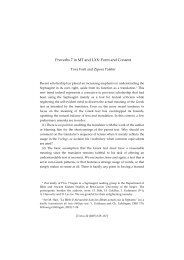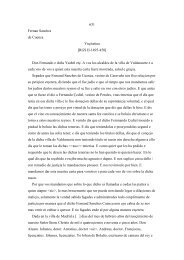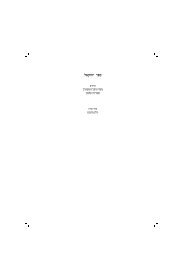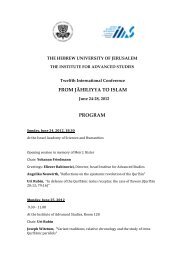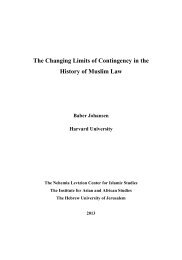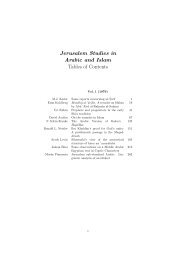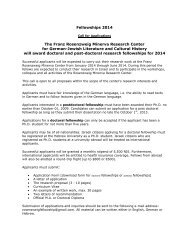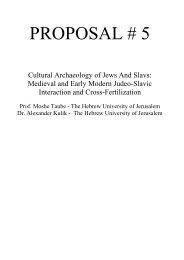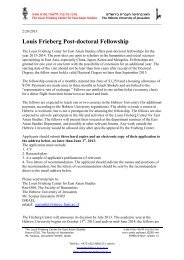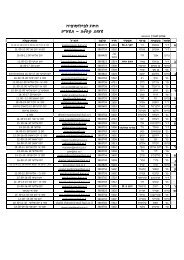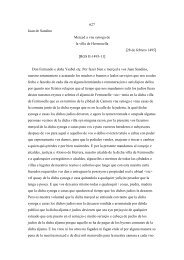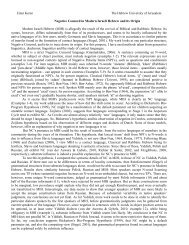THE BOOK OF EZEKIEL Moshe H. Goshen-Gottstein Shemaryahu ...
THE BOOK OF EZEKIEL Moshe H. Goshen-Gottstein Shemaryahu ...
THE BOOK OF EZEKIEL Moshe H. Goshen-Gottstein Shemaryahu ...
You also want an ePaper? Increase the reach of your titles
YUMPU automatically turns print PDFs into web optimized ePapers that Google loves.
V. Apparatus III: Medieval Bible Manuscripts<br />
history of the text of the Hebrew Bible, that is, the period during which the ‘masoretic text’<br />
became dominant (see above, §11), but did not entirely represent the textus receptus. The<br />
Genizah fragments are remnants of manuscripts dating from the end of the first millennium<br />
CE, before the crystallization of the Tiberian masoretic system. They reflect two earlier<br />
branches of the Masora: Palestinian and Babylonian. On the other hand, the complete European<br />
medieval manuscripts date from the 12–15th centuries, and reflect a later stage of<br />
transmission, after the activity of the Masoretes.<br />
72. The first type of sources includes complete MSS which are collated in Kennicott’s edition,<br />
and are indicated here after him as MSS 30, 89, 93, 96, 150. 93 These five manuscripts<br />
were selected from the hundreds recorded by him because of the unparalleled quantity of<br />
variants they contain. If it can be claimed that some medieval manuscripts preserve<br />
‘non-receptus’ readings, 94 these are the most likely candidates: 95<br />
30 Oxford, Bodleian 105 (Tanner 173). 96<br />
Prophets and Hagiographa; France, 13th century.<br />
89 Cambridge University Library, Mm. 5.27<br />
Entire Bible; Spain, 14–15th centuries. 97<br />
93 Cambridge, Gonville and Caius College 404/625<br />
Prophets; Ashkenazi script of the12th century. 98<br />
96 Cambridge, St John’s College A2<br />
Prophets; France, 14th century. 99<br />
93 B. Kennicott, Vetus Testamentum Hebraicum cum Variis Lectionibus (2 vols.; Oxford: Clarendon,<br />
1776–1780). Kennicott collated only the consonantal text and disregarded differences in vocalization.<br />
94 Cf. <strong>Goshen</strong>-<strong>Gottstein</strong>, “Hebrew Biblical Manuscripts” (above, n. 8); cf. also M. Cohen, “Some Basic<br />
Features of the Consonantal Text in Medieval Manuscripts of the Hebrew Bible,” Arie Toeg in<br />
Memoriam (Studies in Bible and Exegesis 1; ed. U. Simon, M. <strong>Goshen</strong>-<strong>Gottstein</strong>; Ramat-Gan:<br />
Bar-Ilan University Press, 1980) 123–182; idem, “The ‘Masoretic Text’ and the Extent of its<br />
Influence on the Transmission of the Biblical Text in the Middle Ages,” Studies in Bible and Exegesis<br />
Presented to Yehuda Elitzur (Studies in Bible and Exegesis 2; ed. U. Simon; Ramat Gan: Bar Ilan<br />
University, 1986) 229–256 (Hebrew).<br />
95 Thanks are due to Dr. Edna Engel of the Hebrew Paleography Project, who supplied us with the<br />
descriptive details of the manuscripts (on the basis of microfilms).<br />
96 Cf. A. Neubauer, Catalogue of Hebrew Manuscripts in the Bodleian Library (Oxford: Clarendon,<br />
1886) 12, §72; M. Beit-Arie ´ and R. E. May, Catalogue of the Hebrew Manuscripts in the Bodleian<br />
Library (Oxford, 1994) 10, §72.<br />
97 Cf. S. C. Reif, Hebrew Manuscripts at the Cambridge University Library: Description and<br />
Introduction (Cambridge: Cambridge University Press, 1997) 54. The collophone dating the<br />
manuscript to the year 856 is an evident forgery.<br />
98 Cf. M. R. James, A Descriptive Catalogue of the Manuscripts in the Library of Gonville and Caius<br />
College Cambridge (Cambridge: Cambridge University Press, 1908) 471, 404/625.<br />
99 Cf. M. R. James, A Descriptive Catalogue of the Manuscripts in the Library of St John’s College<br />
Cambridge (Cambridge: Cambridge University Press, 1913) 2, §2. The MS is irregular in its<br />
vocalization and accentuation, and a number of words and even entire verses are left unvocalized.<br />
xxxvii



